|
|
|
Sort Order |
|
|
|
Items / Page
|
|
|
|
|
|
|
| Srl | Item |
| 1 |
ID:
155069
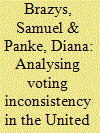

|
|
|
|
|
| Summary/Abstract |
In many international institutions, contested norms pass via voting. Although votes express national positions, dynamic vote shifts are a widespread phenomenon. Why do states sometimes change their voting stances concerning re-occurring international rules and norms? To explain observed variation, this analysis theorises the role of domestic and external windows of opportunity as well as the role of lobbying in the United Nations General Assembly. It shows that changes in government composition and changes in the text of re-occurring international rules and norms matter. Yet, whilst resourceful actors more likely change their voting stance after having successfully negotiated text changes, less powerful states are more likely to shift voting stances in response to third party lobbying.
|
|
|
|
|
|
|
|
|
|
|
|
|
|
|
|
| 2 |
ID:
117856
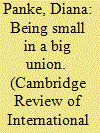

|
|
|
|
|
| Publication |
2012.
|
| Summary/Abstract |
Compared with bigger states, smaller states have fewer votes, less economic power, fewer administrative resources and less staff and experts. This leads to disadvantages in negotiations. Yet smaller states can concentrate their limited resources on issues of great importance and can-under certain conditions-punch above their weight. This is especially effective if small states use their ideational resources in applying different argumentative strategies. Each strategy is only effective under certain scope conditions. The vodka and the pesticides cases illustrate that active small states can punch above their weight if they make arguments that fit the nature of the issue and resonate well with prior beliefs of the addressees of the arguments. A regulatory issue that is technical in nature, such as the pesticides case, requires good scientific arguments. A political issue with prevalent distributive effects, such as the vodka case, calls for normative arguments to persuade neutral actors and the re-framing of the distributional elements into common-good questions to talk actors with opposing preferences into acceptance.
|
|
|
|
|
|
|
|
|
|
|
|
|
|
|
|
| 3 |
ID:
172981
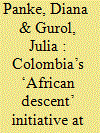

|
|
|
|
|
| Summary/Abstract |
Diana Panke and Julia Gurol discuss a small state effort in a multilateral arena.
|
|
|
|
|
|
|
|
|
|
|
|
|
|
|
|
| 4 |
ID:
178126
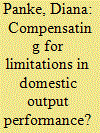

|
|
|
|
|
| Summary/Abstract |
Cooperation in regional international organizations (RIOs) can help member states to work toward and perhaps achieve policy goals that would not be feasible unilaterally. Thus, RIOs might be used as a means of states to compensate for domestic shortcomings in output performance. Do states equip RIOs with policy competencies in order to compensate corresponding domestic performance shortcomings? The analysis of a novel database on policy competencies of 76 RIOs between 1945 and 2015 reveals that usually RIOs are not usually used as window-dressing devices by which states disguise limited domestic output performance. Instead, governments tend to equip RIOs with policy competencies in order to further strengthen their already good output performance in most policy areas. However, in the policy area, ‘energy’ states tend to confer more competencies to their respective RIOs, the worse they perform domestically, indicating that output-related compensation dynamics might be at play in this field.
|
|
|
|
|
|
|
|
|
|
|
|
|
|
|
|
| 5 |
ID:
189266
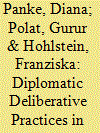

|
|
|
|
|
| Summary/Abstract |
Scholars have demonstrated that deliberation between political actors in states as well as in International Organizations (IOs) matters because it can impact the quality and legitimacy of outcomes. Yet, we do not know much about how deliberation between political actors can be triggered in practice. Drawing on insights from the deliberative turn that has taken place in Comparative Politics as well as insights from International Relations, this paper inquires how different IO institutional features effect the extent of diplomatic deliberation. Unique and novel survey data shows that there is variation between and within IOs. In some IOs, such as the UNFCCC or CoE, diplomats engage in extensive deliberations, while they do so considerably less in others, such as the UNWTO or IWC. Our paper provides novel insights into the inner working of IOs. In general, diplomatic debates are most pronounced in large IOs with high level delegates that often opt for negotiating behind closed doors. In addition, specific institutional design elements matter in the different stages of an IO policy-cycle, such as procedural rules fostering interaction between diplomats in the negotiation stage or a limited policy scope in the voting stage.
|
|
|
|
|
|
|
|
|
|
|
|
|
|
|
|
| 6 |
ID:
117855
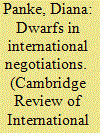

|
|
|
|
|
| Publication |
2012.
|
| Summary/Abstract |
Students of international relations interested in cooperation through international regimes and organizations very often devote their attention to the role of a few big states rather than the numerous small ones. Small states tend to possess fewer administrative and financial resources back home as well as smaller and less well-equipped delegations at the international negotiation table than big states. This can easily translate into difficulties in preparing positions for all items on the negotiation agenda and in developing negotiation strategies in great detail, which might inhibit small states from successfully influencing negotiation outcomes. Yet, since international negotiation often rest on a one-state, one-vote principle and since small states can adjust priorities and redirect their limited capacities, there is a window of opportunity for small states to turn into important international actors and achieve significant outcomes in international affairs. In order to systematically shed light on the role of small states in international negotiations, this article outlines the conceptual framework to answer the following question: How, and under which conditions, can small states successfully punch above their weight in international negotiations?
|
|
|
|
|
|
|
|
|
|
|
|
|
|
|
|
| 7 |
ID:
174084
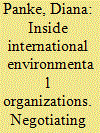

|
|
|
|
|
| Summary/Abstract |
From the late 1960s and early 1970s onwards, environmental politics were not only put increasingly on domestic agendas, but also dealt with in international regimes and organizations (IOs). The rise of environmental IOs has led to the expectation of a greening of international politics and a corresponding contribution to improved environmental standards around the globe. This paper opens the black box of environmental negotiations in IOs and examines how active the various IO member states participate in the process of deciding upon international environmental rules and norms. This reveals two interesting empirical puzzles that the paper examines in a theory-guided methodological sound manner. First, many states joined environmental IOs and contribute to them through membership fees, but nevertheless often fail to make use of their formal right to voice positions in international environmental negotiations. Second, some states are considerably more outspoken than others, although articulating one’s position is important for the chances to influence international environmental policies. The paper argues that the former is due to lack of capabilities, while the latter is due to differences in the saliency of environmental topics across states.
|
|
|
|
|
|
|
|
|
|
|
|
|
|
|
|
| 8 |
ID:
152333
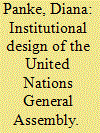

|
|
|
|
|
| Summary/Abstract |
Most international organizations are based on the principle of equality of states. Their institutional design grants all member states the same formal rights. Although formally equal, states differ immensely concerning their power capacities and size. Can institutional designs of international organizations mitigate real-world power- and size-related differences between member states, and if so, to which extent? To provide an answer, this article focuses on the United Nations General Assembly, which combines an equalizing institutional design with a large very heterogeneous membership. It shows that the strength of the equalizing effect varies across stages of the policy cycle. It is the weakest in the negotiation stage and the strongest in the final decision-making stage, while institutional design of international organizations has a de facto equalizing effect of medium strength in the agenda setting stage. Thus, while power and capacity differences matter, larger powerful states are not systematically better off throughout the entire policy cycle.
|
|
|
|
|
|
|
|
|
|
|
|
|
|
|
|
| 9 |
ID:
141194
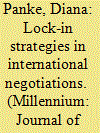

|
|
|
|
|
| Summary/Abstract |
There are hardly any instances of international negotiations, in which states do not at least partially recur to bargaining strategies. This article argues that bargaining power is ultimately a social construction, depending on perceptions about the plausibility of the realisation of a threat. Effective bargaining rests on the credibility of the threats made (e.g. no-vote, veto). Thus, even weak states can sometimes manipulate the threat-potential of seemingly more powerful actors and, thereby, punch above their weight in international negotiations. To trigger a loss of bargaining power, these states need to apply lock-in strategies that create linkages between the issue on the international negotiation agenda and other international or sub-level norms or policy commitments. Once such linkages are made, international-level bargaining threats of formerly powerful actors lose credibility as carrying them out would bring about severe reputation damages. This article distinguishes between different lock-in strategies and draws on three case studies (UNGA resolutions on African descend, on Myanmar, and on the Latin American Nuclear-Weapons-Free-Zone) to provide an empirical plausibility probe on the scope conditions under which the lock-in strategies are effective in reducing the power of seemingly strong actors in international negotiations.
|
|
|
|
|
|
|
|
|
|
|
|
|
|
|
|
| 10 |
ID:
105188
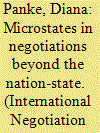

|
|
|
|
|
| Publication |
2011.
|
| Summary/Abstract |
Malta, Cyprus and Luxembourg are sovereign states with less than one million inhabitants and, consequently, are often referred to as "microstates." This article inquires into the negotiation activities and conditions for success of microstates in negotiations beyond the nation-state. It develops a set of hypotheses on negotiation activity and on negotiation success and tests them qualitatively by drawing on the example of day-to-day negotiations in the European Union. Luxembourg is considerably more active than Malta and Cyprus. This is due to differences in domestic coordination practices (performance and cooperation between lead ministries and Permanent Representations), as well as different negotiation styles (proactive vs. reactive). Microstates can be influential, if they actively participate in negotiations for issues of high importance and if they select effective strategies in the given setting. Thus, microstates can sometimes turn into successful shapers of law beyond the nation-state - despite their slimmer administrations, fewer staff and - on average - negligible bargaining power.
|
|
|
|
|
|
|
|
|
|
|
|
|
|
|
|
| 11 |
ID:
143338
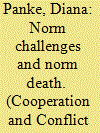

|
|
|
|
|
| Summary/Abstract |
The subject of a formerly strong norm’s death is not often in the limelight of political science research. This paper investigates successful norm challenges and analyses the conditions that lead to the abolition of norms rather than to limitations of the norms. It presents a theoretical account of norm challenges and develops hypotheses on mechanisms, success and outcomes. Six illustrative case studies show that norm contestations take place through non-compliance when norms are not embedded in international negotiation systems, while norm contestations through negotiation are frequently the case if norms are embedded in international regimes or organizations. Irrespective of the institutional context, the strength of norm challengers relative to norm proponents impacts the prospects for successful normative change. If norm challengers are stronger than the actors defending the status quo, the outcome of norm challenges is influenced by the combination of norm precision and the stability of the normative environment. If the broader context undergoes change while the contested norm is precise, norms cannot be reinterpreted to accommodate norm change. As a result, in such instances, norms die. By contrast, vague norms in combination with stable environments are not abolished after being subject to strong challenges, but are merely reinterpreted in a manner delimiting their applicatory scope.
|
|
|
|
|
|
|
|
|
|
|
|
|
|
|
|
| 12 |
ID:
157684
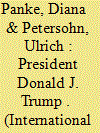

|
|
|
|
|
| Summary/Abstract |
Since his inauguration, US President Donald Trump has made news by violating international and domestic norms, such as norms of diplomatic communication or the non-discrimination norm. This paper uses theoretical approaches to norm eradication in order to examine whether President Trump has turned into an effective agent of norm death leading to the abolition of domestic and international standards of appropriateness. It discusses how the precision of the respective norms, the stability of their contexts, and the actions of norm proponents have played out. This reveals that President Trump’s actions have so far lacked effectiveness, and have not led to norm death. The longevity of challenged norms cannot be taken for granted, however—especially if the challenger is a powerful actor. In order to avoid norm death under this circumstance, it is essential that norm proponents possess capacities and competencies to act, and employ them to defend challenged norms.
|
|
|
|
|
|
|
|
|
|
|
|
|
|
|
|
| 13 |
ID:
193233
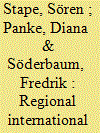

|
|
|
|
|
| Summary/Abstract |
Foreign aid to regional international organizations (RIOs) has increased tremendously in recent decades. The vast differences between RIOs give rise to the question of why some RIOs attract considerable amounts of aid while others attract much less, or even nothing at all. To address that question, this article sets out and examines a set of hypotheses that focus on various characteristics of RIOs that allow donors to reduce transaction costs. Empirically, the analysis proceeds via two steps: the hypotheses are first subjected to an empirical plausibility probe based on quantitative methods and then illustrated based on case study of the Southern African Development Community. The findings reveal that RIOs are most attractive when they operate in a range of policy fields, involve many member-states and are engaged in long-lasting collaborations with donors. By contrast, there is little support for conventional explanations as to why RIOs attract funding – for instance, claims that being democratic, being most in need or providing donors with market access will lead to greater funding. The rather disturbing policy implication is that a small number of RIOs are likely to continue to attract the bulk of funding, whereas poorly funded RIOs are unlikely to attract significant amounts of aid.
|
|
|
|
|
|
|
|
|
|
|
|
|
|
|
|
| 14 |
ID:
123174
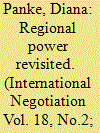

|
|
|
|
|
| Publication |
2013.
|
| Summary/Abstract |
Abstract The United Nations General Assembly is the International Organization (IO) with the broadest worldwide membership. While regional organizations are not members themselves, they can and often do become active through their own member states. This article addresses two questions: Do regional organizations differ in their ability to speak with one voice in IOs and, if so, why? Are some regional organizations more successful than others and, if so, why? Based on liberal theory and a mixed-methods approach, the research suggests, firstly, that regional organizations are in a better position to engage in collective action in IOs if they can develop group positions for a broad range of items. This is easier the greater the capacities and the stronger the incentives of the member states, the smaller the number of actors participating in regional organizations' coordination meetings, and the more homogenous groups are. Secondly, regional organizations are especially successful in IOs if they have common positions that their experienced and knowledgeable member states can push via argumentative strategies and if regional organizations can rely on the larger membership when it comes to playing two-level games in UNGA negotiations (tied-hands strategy) and when it comes to voting in IOs.
|
|
|
|
|
|
|
|
|
|
|
|
|
|
|
|
| 15 |
ID:
105954
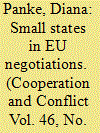

|
|
|
|
|
| Publication |
2011.
|
| Summary/Abstract |
Based on a comprehensive survey conducted in 2009, this article analyses similarities and differences in the policy-shaping activities of all 27 European Union member states in the day-to-day policy-making process of the EU. It shows that some states participate more actively in EU working parties and the COREPER than others. Do bigger states use negotiation strategies more frequently than smaller states? Do the available capacities crucially influence how frequently a delegation employs negotiation strategies in a particular policy field? The article develops a set of willingness- and capacity-related hypotheses and tests them using qualitative and quantitative methods. It shows that small states can surmount size-related difficulties most importantly through the accumulation of expertise. Thus, size is what states make of it. Small states are neither per se political dwarfs nor power-brokers.
|
|
|
|
|
|
|
|
|
|
|
|
|
|
|
|
| 16 |
ID:
117859


|
|
|
|
|
| Publication |
2012.
|
| Summary/Abstract |
There are many small states in the international system, which have considerably fewer capacities than their bigger counterpart. The study of multilateral negotiations in the European Union (EU), conferences taking place under the umbrella of the United Nations (UN), negotiations on the set up of an International Criminal Court (ICC), as well as the compliance bargaining in the World Trade Organisation (WTO) reveals that small states can sometimes be very influential-despite their size. Small states tend to be most likely to punch above their weight if the negotiations take place in an institutionalised arena with majority-based decision-making rules in which each state has one vote or in contexts in which decisions are made unanimously, if they are selective in negotiations and concentrate their capacities on the most important issues, engage in capacity-building activities to maximise their ideational resources, if they make use of institutional opportunity structures such as chairing meetings and engaging in agenda-setting, and if they individually or collectively apply persuasion strategies from early on.
|
|
|
|
|
|
|
|
|
|
|
|
|
|
|
|
| 17 |
ID:
172315
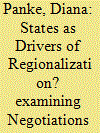

|
|
|
|
|
| Summary/Abstract |
The political regulation of the economy takes place on domestic, regional and international levels. Often, states are members of regional and international organizations (ROs and IOs) with competencies in the economic realm. This study explores the effects of such overlaps in membership and policy focus, and examines negotiations in economic Ios. It studies the phenomenon of states being drivers of regionalization of international negotiations. This analysis reveals that states make a conscious choice to influence regionalization of international economic policies. States with strong export sectors and strong economies are more inclined to act on behalf of their RO in international economic negotiations. Apart from incentives, capacities also matter. States need to have domestic and diplomatic capacities to become active in Ios in the first place.
|
|
|
|
|
|
|
|
|
|
|
|
|
|
|
|
| 18 |
ID:
178202
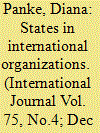

|
|
|
|
|
| Summary/Abstract |
States address many of today’s global problems in international organizations (IOs). At the same time, regional international organizations (RIOs) play important roles in IOs, as a series of case studies suggests. RIO member states can speak on behalf of an RIO in IO negotiations. This paper explores under what conditions states voice RIO positions instead of national ones in IOs and thereby turn into agents of regionalization. Based on a novel dataset of more than 500 international negotiations and a quantitative analysis of theory-guided International Relations hypotheses, this paper shows that states are increasingly likely to negotiate on behalf of an RIO, when they regard grouping positions into regional blocs in IO negotiations as more effective, when they have a formal role as RIO chair, and when they possess financial and staff capacities needed in order to voice a regional position in international negotiations.
|
|
|
|
|
|
|
|
|
|
|
|
|
|
|
|
| 19 |
ID:
157533
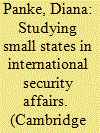

|
|
|
|
|
| Summary/Abstract |
Todays’ international security architecture composed of international security treaties and international security norms has been established and formalized by negotiations. Owing to the great importance of international security negotiations for international security practices, this paper sheds light on negotiation activities. A study of 100 different international security negotiations shows that states vary considerably with respect to their negotiation activity. Some countries voice positions very often, while others remain completely silent. This is puzzling, as active negotiation participation is an expression of state sovereignty and a means to influence the shape of the international security architecture. The article distinguishes between capacity and incentives as driving forces of state activity in international security negotiations. The analysis reveals that, next to political and financial capacities, states that place high priority on military matters are more active, while smaller and poorer states are more likely to shelter under the security umbrella of larger counterparts.
|
|
|
|
|
|
|
|
|
|
|
|
|
|
|
|
| 20 |
ID:
134270
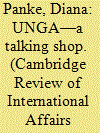

|
|
|
|
|
| Summary/Abstract |
The United Nations General Assembly (UNGA) is frequently criticized as being an inefficient talking shop. Such criticism is partially due to the fact that UNGA resolutions are not legally binding, and partially due to the considerable share of resolutions that are debated repeatedly in multiple UNGA sessions. This article shows that more than half of the resolutions on the negotiation agenda of the UNGA in a given year are not novel, but have been discussed in the same arena in the past. As this increases the negotiation workload and also the capacity requirements of the member states, the widespread phenomenon of repetitions is puzzling. Therefore, the article examines the reasons behind reoccurring resolutions. It distinguishes between incrementalist and symbolic rationales and sheds light on the different motivations for repetitions in a series of case studies. This reveals that both rationales matter for repeating resolutions and that neither symbolic politics nor incrementalism are confined to specific types of issues or actors.
|
|
|
|
|
|
|
|
|
|
|
|
|
|
|
|
|
|
|
|
|